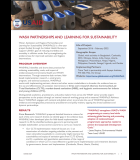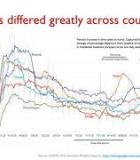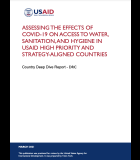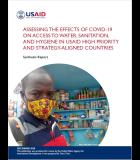Jenga Jamaa II Project
Ranked 186th out of 187 countries in the UNDP’s 2013 Human Development Index, the Democratic Republic of the Congo (DRC) faces critical challenges that affect its capacity to ensure a peaceful and sustainable living for its inhabitants. While showing signs of political and economic recovery following the transitional process (2005) that saw insecurity declining and international donors supporting and funding programs anew, the country is still prone to violence and insecurity. This is especially the case in Eastern DRC (EDRC), as evidenced by sporadic fighting and frequent insecurity incidents in many areas in EDRC, including a number of JENGA II project areas.
Activity Description
The overall goal of JENGA II is to sustainably reduce food insecurity among vulnerable households in Fizi, Uvira, and Kalehe Territories of South Kivu Province, and JENGA II aims to reach over 150,000 individuals during the life of the project. The project also invested in a range of WASH activities in eastern DRC.
JENGA II, which utilizes a gender-sensitive programming approach, includes four Strategic Objectives (SOs) to achieve the project goal:
- Food insecure farming households with increased incomes (the project’s “Agriculture and Marketing” component)
- Improved health and nutritional status of children under-5 (the project’s “Health and Nutrition” component)
- Increased women’s socio-economic empowerment in food insecure communities
- Strengthened community resilience to food security shocks
Expected Outcomes
- Increased agricultural productivity and diversified production of smallholder farmers
- Enhanced commercialization of agricultural products of smallholder farmers
- Improved health and nutritional status of children under 5
- Increased women's socio-economic empowerment in food insecurity
- Strengthened community resilience to food security shocks
Actual Outcomes
- USAID capped 76 springs and rehabilitated 23 existing water facilities to improve water access in rural communities.
- USAID constructed 638 household latrines and 19 communal latrines in schools and health facilities.
- Participating villages elected water and sanitation committees for all water points and communal latrines. USAID trained committee members, including men and women, on management and maintenance.
- More than 2,599 leader mothers and 24,777 mothers of children under 5 were trained on the use of clean water and sanitation facilities.





